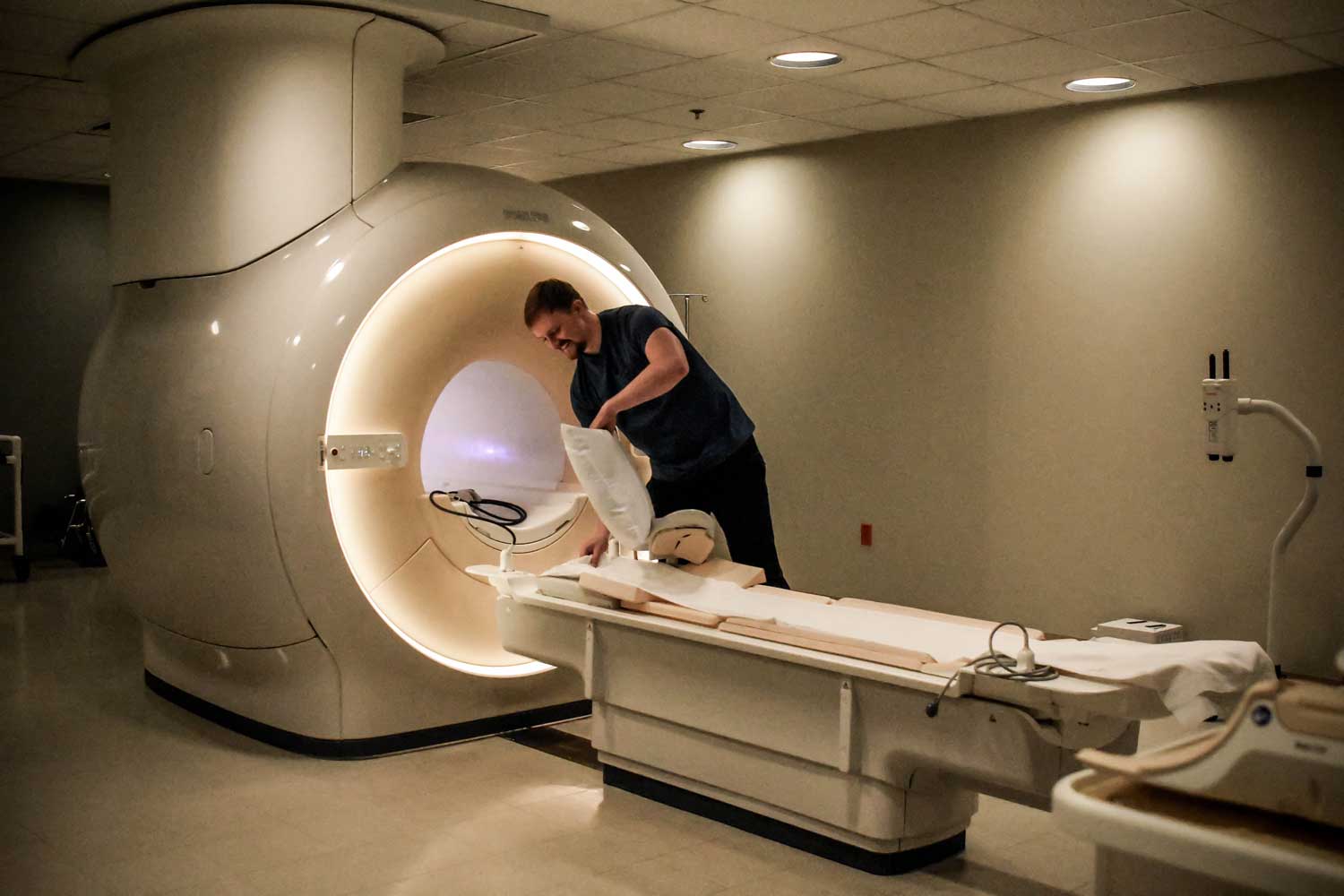MRI Scan
The MRI equipment at Newman Regional Health is used to produce detailed images of the brain, heart, joints, or abdomen. Our equipment has a wider width to help increase comfort for patients during the test.

A magnetic resonance imaging (MRI) scan is an imaging test that uses powerful magnets and radio waves to create pictures of the body. It does not use ionizing radiation (x-rays). Single MRI images are called slices. The images can be stored on a computer or printed on film. One exam can produce thousands of images.
Newman Regional Health is equipped with a Philips Ingenia 1.5 Tesla ultra-short bore MRI system, which is the most open high field scanner available. The digital clarity and speed of this machine helps physicians diagnose with confidence and work productively. Newman’s MRI is comfortable for patients because of its wide bore design. The increased width of the machine opening decreases claustrophobic feelings.
How the Test is Performed
You may be asked to wear a hospital gown or clothing without zippers or snaps, such as sweatpants and a t-shirt. Certain types of metal can cause blurry images. You will lie on a narrow table, which slides into a large tunnel-shaped scanner. Some exams require a special dye (contrast) to provide extra information about the blood vessels. Most of the time, the dye will be given by IV through a vein in your hand or forearm before the test. The dye helps the radiologist see certain areas more clearly. Small devices, called coils, may be placed around the head, arm, or leg, or around other areas to be studied. These help send and receive the radio waves, and improve the quality of the images. During the MRI, the person who operates the machine will watch you from another room. The test lasts about 30 to 60 minutes, but may take longer.
How to Prepare for the Test
You may be asked not to eat or drink anything for 4 to 6 hours before the scan. Tell your health care provider if you are afraid of close spaces (have claustrophobia). You may be given a medicine to help you feel sleepy and less anxious. Before the test, tell your provider if you have:
- Artificial heart valves
- Brain aneurysm clips
- Heart defibrillator or pacemaker
- Inner ear (cochlear) implants
- Kidney disease or dialysis (you may not be able to receive contrast)
- Recently placed artificial joints
- Vascular stents
- Worked with sheet metal in the past (you may need tests to check for metal pieces in your eyes)
Because the MRI contains strong magnets, metal objects are not allowed into the room with the MRI scanner:
- Items such as jewelry, watches, credit cards, and hearing aids can be damaged.
- Pens, pocketknives, and eyeglasses may fly across the room.
- Pins, hairpins, metal zippers, and similar metallic items can distort the images.
- Removable dental work should be taken out just before the scan.
How the Test will Feel
An MRI exam causes no pain. If you have difficulty lying still or are very nervous, you may be given a medicine to relax you. Too much movement can blur MRI images and cause errors. The table may be hard or cold, but you can request a blanket or pillow. The machine produces loud thumping and humming noises when turned on. You can wear ear plugs to help reduce the noise. An intercom in the room allows you to speak to someone at any time. Some MRIs have televisions and special headphones that you can use to help the time pass. There is no recovery time, unless you were given a medicine to relax. After an MRI scan, you can resume your normal diet, activity, and medicines.
Why the Test is Performed
Having an MRI can often help:
- Diagnose an infection
- Guide a doctor to the right area during a biopsy
- Identify masses and tumors, including cancer
- Study blood vessels
Results
Results depend on the part of the body being examined and the nature of the problem. Different types of tissues send back different MRI signals. For example, healthy tissue sends back a slightly different signal than cancerous tissue. Consult your provider with any questions and concerns.
Risks
MRI does not use ionizing radiation. No side effects from the magnetic fields and radio waves have been reported. The most common type of contrast (dye) used is gadolinium. This substance is thought to be generally safe for most people. Gadolinium is retained in the brain and other organs (including the skin in people with kidney disease) after use. In rare cases, organ and skin damage have occurred in patients with preexisting kidney failure.Tell your provider before the test if you have kidney problems. The strong magnetic fields created during an MRI can cause heart pacemakers and other implants not to work as well. The magnets can also cause a piece of metal inside your body to move or shift.
